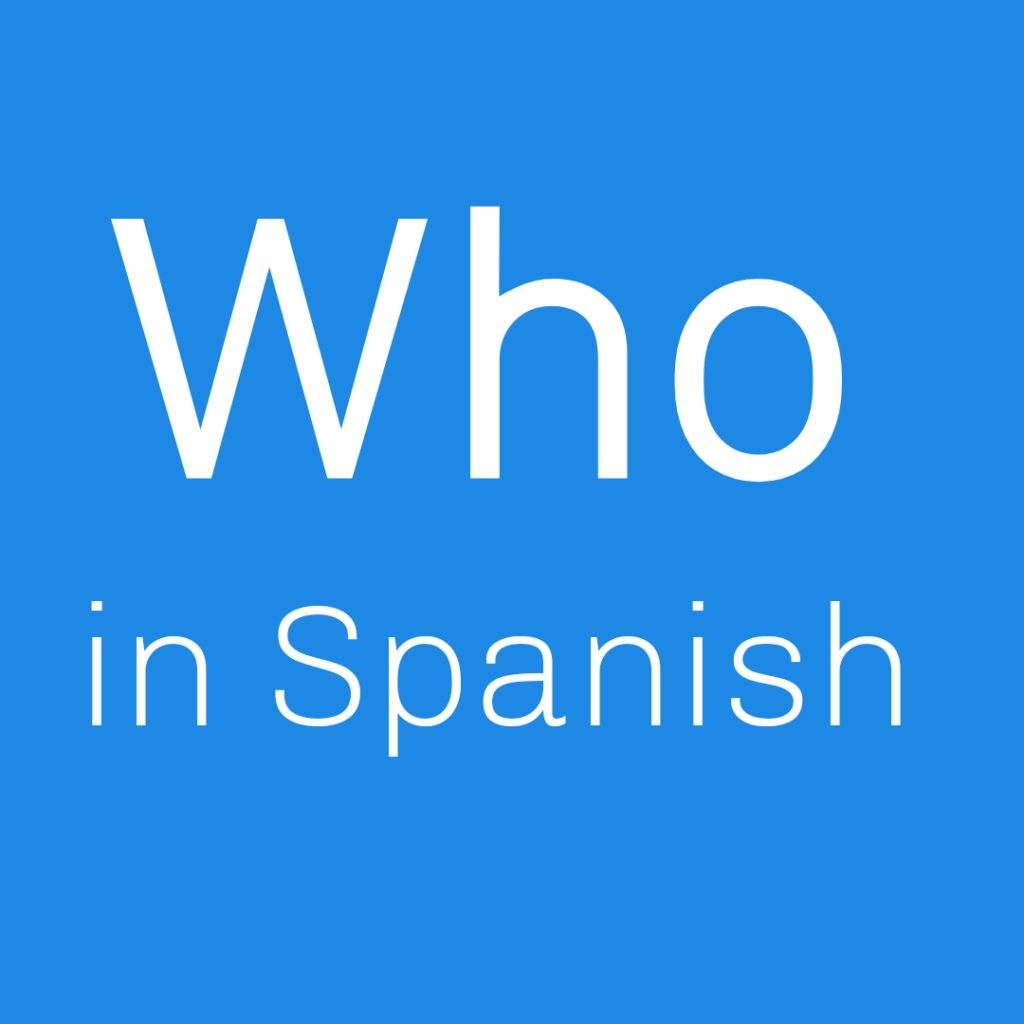What is who in Spanish?. Who is the word that is used as a question and subject pronoun when we ask about someone and also represents a possessive pronoun with its variation like ‘whose’ and an object pronoun ‘whom’.

How do you say ‘Who in Spanish’?
This word is a subject pronoun translated in the Spanish language as: ‘¿quién?’.
‘Who’ is similar to “he,” “she”, ‘they” and “we”. You can use “who” to ask which person performs an action.
Conversation:
Marta: Pedro, ¿quién está ahí? | Pedro, who is there?
Pedro: Es Ana | Is Ana.
Sentences with the word who in Spanish
| ¿Quién es el responsable de todo esto? | – | Who is responsible for all this? |
| Mira a ver quién está ahí. | – | Look to see who is there. |
| Pero durante este tiempo, ¿quién estaba sentado en el trono? | – | But during this time, who was sitting on the throne? |
| ¿Y quién es la otra mitad de tu pareja? | – | And who is the other half of your partner? |
| Ahora, ¿quién de nosotros puede hacer tu vida más incómoda? | – | Now, who among us can make your life more uncomfortable? |
| Como el hombre dijo, ¿quién quiere comprar un libro? | – | Like the man said, who wants to buy a book? |
| Más control sobre quién puede hacer qué con cada pregunta. | – | More control over who can do what with each question. |
| En otras palabras, ¿quién podrá saber o entender estas cosas? | – | In other words, who will be able to know or understand these things? |
| Ahora sabes quién está actuando bajo ese seudónimo. | – | Now you know who is acting under that pseudonym. |
| No hay forma de saber quién estaba en esa habitación. | – | There is no way of knowing who was in that room. |
| Si alguien le hizo esto, descubran quién. | – | If someone did this to him, find out who. |
| Demostró exactamente quién es. | – | He showed exactly who he is. |
| Bien, entonces, ¿quién está al otro lado de la puerta? | – | Okay, so who’s on the other side of the door? |
| Cuando alguien se escapa con un cheque, ¿sabes quién paga? | – | When someone runs away with a check, do you know who pays? |
| Dígame, por favor, ¿quién es el prisionero de esta celda? | – | Tell me, please, who is the prisoner in this cell? |
| ¿Sabes quién es el más inteligente? | – | Do you know who is the smartest? |
| Vale, ¿quién de esta habitación no ha realizado esta acción? | – | Okay, who in this room hasn’t performed this action? |
| Ellos están tratando de averiguar quién era. | – | They are trying to find out who he was. |
| Existen cuatro enmiendas a la Constitución sobre quién puede votar. | – | There are four amendments to the Constitution on who can vote. |
| Pero un año o dos de ahora, quién sabe. | – | But a year or two from now, who knows. |
| Entonces, ¿quién es el responsable de esta crisis actual? | – | So who is responsible for this current crisis? |
| Así que debes saber algo sobre quién amañó la elección. | – | So you must know something about who rigged the election. |
| Pero quiero decir, ¿quién conoce el agua mejor que él? | – | But I mean, who knows the water better than him? |
| Y esta vez, veremos quién tiene razón sobre todo esto. | – | And this time, we will see who is right about all this. |
| ¿Quién sabe la verdad? | – | Who knows the truth? |
| Tienes que decirme quién está detrás de todo esto. | – | You have to tell me who is behind all this. |
| Quiero decir, ¿quién no querría cinco minutos con el presidente? | – | I mean, who wouldn’t want five minutes with the president? |
| La gente tiene una cierta imagen de quién es importante. | – | People have a certain image of who is important. |
| Y la respuesta variaría dependiendo de a quién le pregunte. | – | And the answer would vary depending on who you ask. |
| ¿A quién le importa cuánto dinero tenemos hoy o mañana? | – | Who cares how much money we have today or tomorrow? |
When to use ‘Whom’?
This word is an object pronoun and is translated as: ‘¿a quién?’ or ‘¿para quién?’.
‘Whom’ is similar to “him,” “her” and “us” You can use ‘whom’ to ask which person is the one receiving an action.
| ¿Para quién vas a cocinar? | – | Whom are you going to cook for? |
| ¿A quién vas a llamar? | – | Whom are you going to call? |
When to use ‘Whose’?
This word is a possessive pronoun and is translated in the Spanish language as: ‘¿de quién?’ .
Whose is similar to “his,” “her” and “our.” You can use ‘whose’ to find out who owns something.
| ¿De quién es esta bolsa de aquí? | – | Whose bag is this here? |
| ¿De quién es el carro con alarma? | – | Whose car with alarm is it? |
